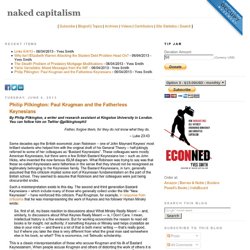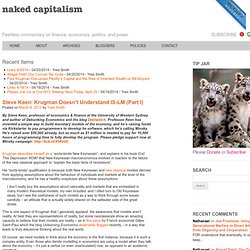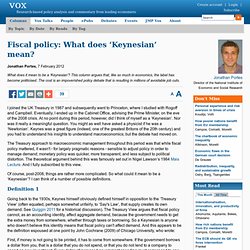

Philip Pilkington: Paul Krugman and the Fatherless Keynesians. By Philip Pilkington, a writer and research assistant at Kingston University in London.

You can follow him on Twitter @pilkingtonphil Father, forgive them, for they do not know what they do. – Luke 23:43 Some decades ago the British economist Joan Robinson – one of John Maynard Keynes’ most brilliant students who helped him with the original draft of his General Theory – half-jokingly referred to some of her colleagues as “Bastard Keynesians”. These colleagues were mostly American Keynesians, but there were a few British Bastard Keynesians too – such as John Hicks, who invented the now famous ISLM diagram. What Robinson was trying to say was that these so-called Keynesians were fatherless in the sense that they should not be recognised as legitimately belonging to the Keynesian family. Such a misinterpretation exists to this day. This is a classic misrepresentation of those who accuse Krugman and his ilk of Bastard Keynesianism. Inconsistencies in the Bastards’ Arguments. Steve Keen: Krugman Doesn’t Understand IS-LM (Part I)
By Steve Keen, professor of economics & finance at the University of Western Sydney and author of Debunking Economics and the blog Debtwatch.

Professor Keen has invented a simple way to build monetary models of the economy, and he’s raising funds via Kickstarter to pay programmers to develop he software, which he’s calling Minsky. He’s raised over $50,000 already, but as much as $1 million is needed to pay for 10,000 hours of programming time to fully develop the program. Please pledge support now at Minsky campaign: Krugman describes himself as a “sorta-kinda New Keynesian”, and explains in his book End This Depression NOW! That New Keynesian macroeconomics evolved in reaction to the failure of the new classical approach to “explain the basic facts of recessions”. This is one aspect of Krugman that I genuinely applaud: the awareness that models aren’t reality.
Of course, we need models to think about the economy in the first instance, because it is such a complex entity. References. What does ‘Keynesian’ really mean? I joined the UK Treasury in 1987 and subsequently went to Princeton, where I studied with Rogoff and Campbell.

Eventually, I ended up in the Cabinet Office, advising the Prime Minister, on the eve of the 2008 crisis. At no point during this period, however, did I think of myself as a ‘Keynesian’. Nor was it really a meaningful question. You might as well have asked a physicist if he was a ‘Newtonian’. Keynes was a great figure (indeed, one of the greatest Britons of the 20th century) and you had to understand his insights to understand macroeconomics; but the debate had moved on.